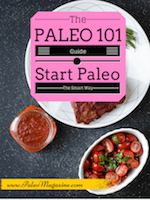10 Reasons to Avoid Eating Legumes [+ Infographic]
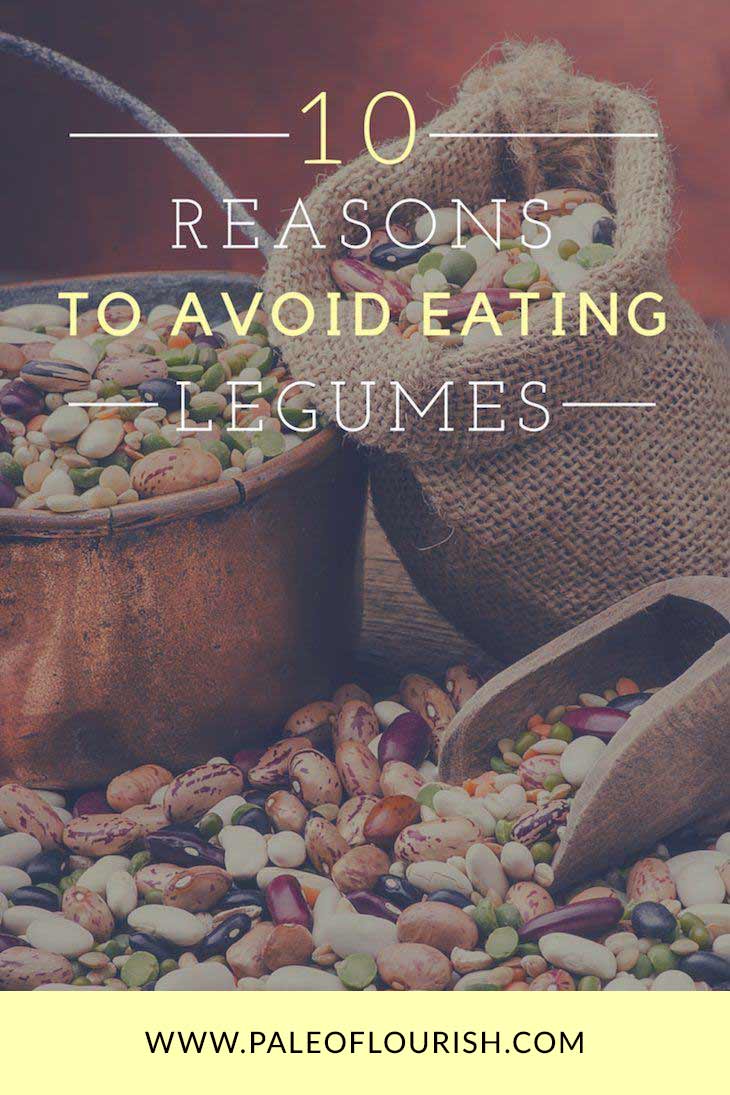
Have you ever stopped to reflect on the ways that we talk about beans?
Take the most famous beans in history, for example…
Young Jack was on his way to town to sell his family’s only cow, when a stranger talked him into trading the cow for a handful of “magic” beans. When Jack got back home, his mother was so furious about having only the worthless beans, that she threw them out the window. (The rest of that story took a more fantastic twist, of course.)
And even today, you might off-handedly note that something isn’t worth a “hill of beans,” indicating that it’s practically worthless.
However, if you spend 2 minutes on Google right now, you can find hundreds of articles about the health virtues of beans. Many sites praise their nutritional value, their high-fiber content, their ability to help prevent cancer, and even the amount of protein you can get from legumes.
They’re such darlings in the vegetarian and vegan world that you might think beans actually lead to bags of gold, golden-egg-laying hens, and magical harps.
And yet, you’re Paleo. You avoid legumes at all costs. Are you missing out???
Btw, if you want to find out more about Paleo, check out this article on the Paleo diet here. And if you’re confused by what is and what isn’t Paleo, you can find a comprehensive list of Paleo foods here.
First of All, What is a Legume???
To over-generalize, a legumes is a bean, pea, lentil, or peanut.
To get a bit more specific, here’s a list of the most common legumes (check out this site if you want a really comprehensive list):
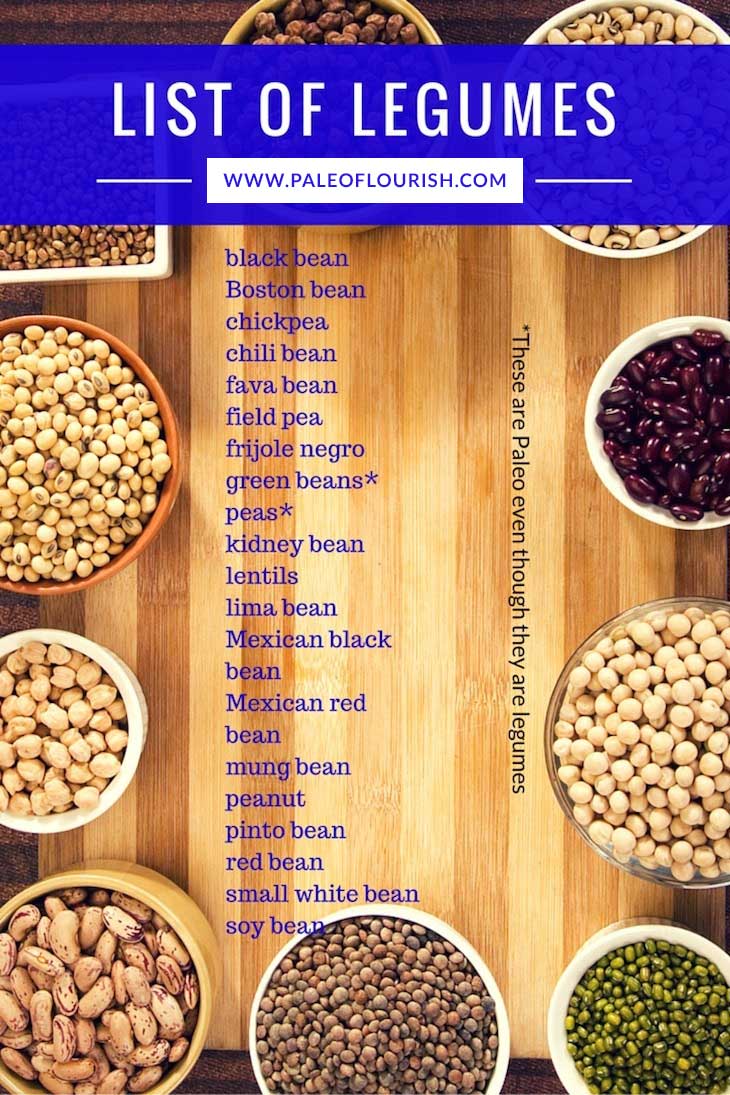
black bean
Boston bean
chickpeas
chili bean
fava bean
field pea
frijole negro
green beans and peas (yes, these are Paleo – read this article for why they are Paleo)
kidney bean
lentils
lima bean
Mexican black bean
Mexican red bean
mung bean
peanut
pinto bean
red bean
small white bean
split peas
soy bean (read this article for soy specific issues)
Should You Eat Legumes?
Most Paleo folk steer clear of legumes, but do you really know why?
While I don’t think legumes are the worst thing you can eat – things like pizza, milkshakes, and donuts are far worse – but, here are 10 reasons why it’s still healthier to avoid legumes (please pin the infographic below).
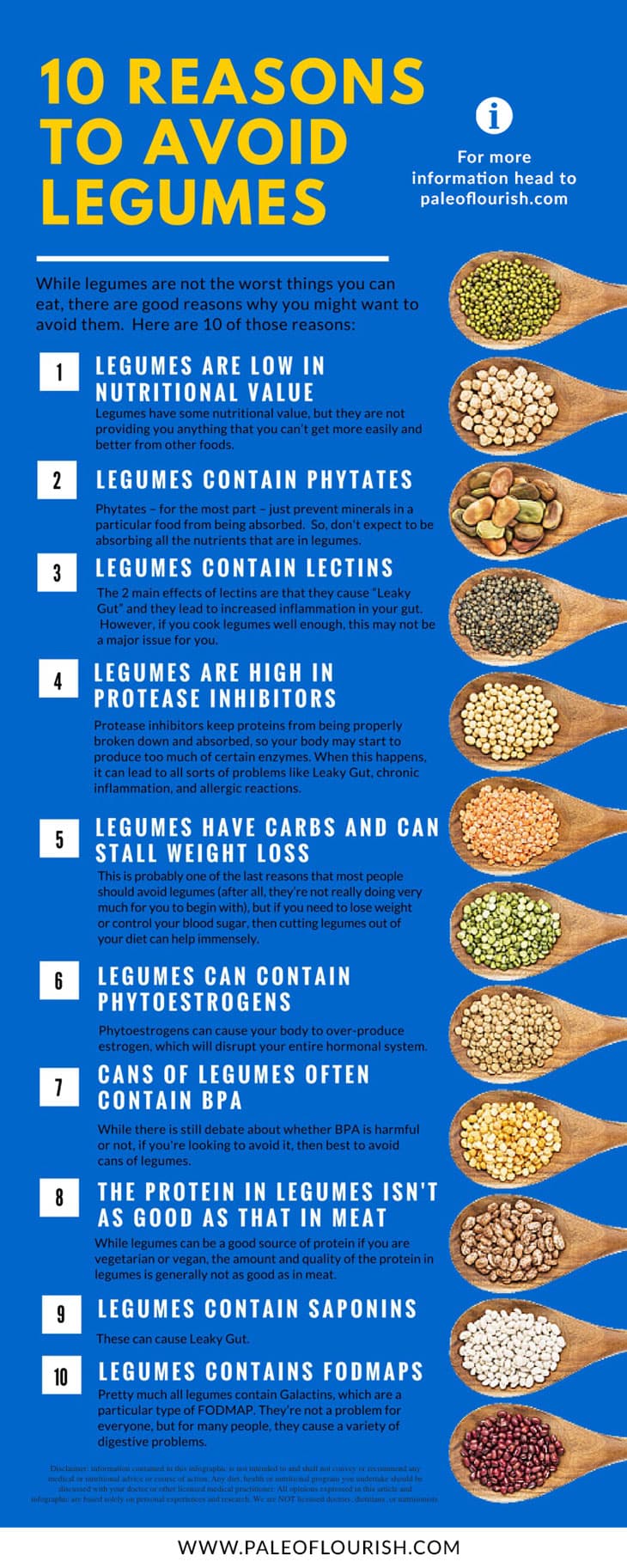
Proponents of legumes list nutritional values that are based almost entirely on the legume in its raw state, but once a legume is cooked, it loses much (though not all) of its nutritional value.
Legumes are often praised for being a great source of protein, and while they do contain a decent amount, they’re still nowhere near as good as most animal sources, particularly when you account for the quality of the protein.
Legumes are also often high in iron, magnesium, potassium, and calcium. Unfortunately, these are the primary minerals that don’t get absorbed due to high phytate levels (see #2 below).
The Takeaway is that legumes have some nutritional value, but they are not providing you anything that you can’t get more easily and better from other foods.
2. Legumes Contain Phytates
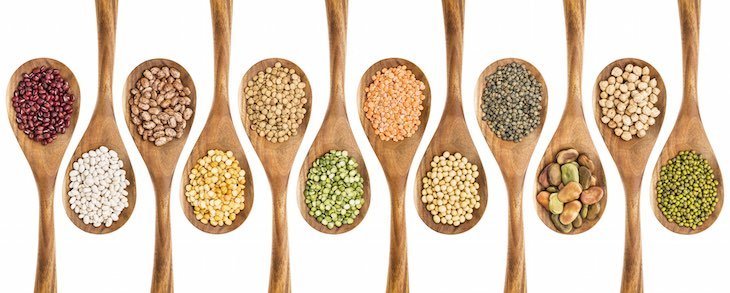
Phytates – for the most part – just prevent minerals in a particular food from being absorbed. They’re not stealing minerals out of your body.
Phytates are not a major concern on their own. But if you’re planning on eating beans or lentils as a large portion of your diet, then it’s worth knowing that you’re not actually absorbing a lot of the minerals. This is particularly important if you’re considering replacing meat and animal fat with legumes, since meat and animal fats are some of the most nutritious foods you can eat.
In addition, phytates also inhibit the functioning of certain enzymes that are critical to digestion, such as pepsin and amylase. This explained a bit more in point #4 below. For a really thorough discussion of phytates, see this Weston A. Price Foundation article.
3. Legumes Contain Lectins
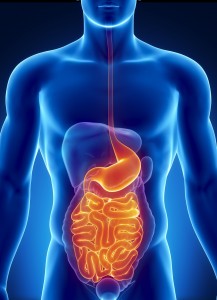 Lectins are a class of proteins that plants produce partially in order to protect themselves from predators. (You can read more about lectins here.) Some lectins (such as Wheat-Germ-Agglutinin – found primarily in wheat) are terrible and definitely cause problems.
Lectins are a class of proteins that plants produce partially in order to protect themselves from predators. (You can read more about lectins here.) Some lectins (such as Wheat-Germ-Agglutinin – found primarily in wheat) are terrible and definitely cause problems.
The 2 main effects of lectins are that they cause “Leaky Gut” and they lead to increased inflammation in your gut.
Both of these things may not cause any immediate problems when you eat lectins, but they often lead long-term to all sorts of problems, such as not being able to properly absorb vitamins and minerals, food allergies, arthritis, and a variety of other issues. Here’s a post from Sarah Ballantyne that explains more.
Some of the most well-known lectins are Peanut Agglutinin, Phytohaemagglutinin, and Ricin, all of which are found in legumes such as peanuts, kidney beans, and castor beans.
(Take a look at our Paleo diet food list if you are surprised to find out that peanuts are legumes!)Now, most lectins are deactivated by heat, meaning that when you cook these foods, most of the lectins become harmless. There are exceptions to this (including both Wheat Germ Agglutinin and Peanut Agglutinin), but this is one of the main reasons that lectins are not as big of a problem as some people make them out to be.
Still, it’s something to consider. In particular, if you have any existing gut issues (IBS, for instance) or any auto-immune conditions (like Crohns or Hashimotos), then lectins are probably going to be far more problematic for you.
4. Legumes are High in Protease Inhibitors
Proteases are enzymes that break down proteins. So Protease Inhibitors are molecules that stop proteases from doing their job.
In your body, because protease inhibitors keep proteins from being properly broken down and absorbed, your body starts producing too much of certain enzymes. When this happens, it can lead to all sorts of problems like Leaky Gut, chronic inflammation, and allergic reactions.
Soy is particularly bad about this, but most legumes are quite high in protease inhibitors.
5. Legumes Have Carbs and Can Stall Weight Loss
I don’t think that carbs are necessarily “bad” for you.
That said, many of us have damaged our bodies and our metabolisms through decades of eating crap and not moving around very much.
If you are such a person – particularly if you are overweight, or worse, have Diabetes – then carbs are probably not your friend the way that they might be for someone who is healthy and not metabolically damaged.
Legumes – although they have more protein and fiber than most highly processed junk food like potato chips or cookies, still have quite a few carbs.
This is probably one of the last reasons that most people should avoid legumes (after all, they’re not really doing very much for you to begin with), but if you need to lose weight or control your blood sugar, then cutting legumes out of your diet can help immensely.
6. Legumes Can Contain PhytoEstrogens
Phyto means “plant,” and you generally know what estrogen is. So it’s not too difficult to figure out what a phytoestrogen might be.
Phytoestrogens are not actually estrogen, but they act like estrogen. Inside your body, phytoestrogens bind to the same receptors that estrogen binds to, but phytoestrogens give a much weaker signal than estrogen. Because the signals are weak, your body will often over-produce estrogen, which will disrupt your entire hormonal system.
This can lead to a variety of problems, such as disrupted reproduction and infertility, bladder cancer, asthma, and increased incidence of Alzheimers.
7. Cans of Legumes Contain BPA
BPA is a chemcial found mostly in plastic. It is strongly associated with heart disease, prostate cancer, breast cancer, miscarriage, erectile dysfunction, and abnormal reproductive development in children.
Legumes don’t naturally have BPA, of course, but the lining of many cans contains BPA.
If you’re eating fresh legumes that haven’t been canned, then this isn’t a concern. Also, there are suggestions that BPA may not be so harmful actually (see Chris Kresser’s article here).
8. Legumes have some Protein and Fiber
This is not actually a reason to avoid legumes, but it’s important to know.
Legumes tend to have more protein and more fiber than most other plants. This is particularly important for vegetarians, since protein can be hard to come by. In addition, much of the fiber in beans is soluble, which promotes – rather than disrupts – gut health.
Like I said, there are some positive qualities to legumes.
However, if you’re not vegetarian, the argument for protein is a fairly weak one, since legumes pale in comparison to most animal sources of protein, both in amount and in quality.
In terms of fiber, legumes are a good source, but contrary to popular belief, fiber is not particularly vital to one’s health, and in any case, if you’re eating enough vegetables (and maybe some occasional fruits), you’re going to get your fiber.
9. Legumes Contain Saponins
Legumes are extremely high in saponins. Ok…but what the heck are saponins???
Saponins are compounds that are found in many plants, including most legumes. They have a particular chemical structure that allows them to bind to the surface of your intestinal cells.
Once saponins bind to your intestinal walls, they often cause the cells lining your intestines to either “open up” or else to die. In either case, the effect is a Leaky Gut.
Once that happens, saponins, bacteria, and other things start leaking into your bloodstream. An immediate effect is that saponins start destroying the cell membranes of your red blood cells (as well as leading to general inflammation in your body). After that, all sorts of other bad things start happening.
10. Legumes Contains FODMAPs
FODMAPs are a type of carbohydrates. They’re not a problem for everyone, but for many people, they cause a variety of digestive problems.
Pretty much all legumes contain Galactins, which are a particular type of FODMAP.
If you know or suspect that you have digestive issues like Irritable Bowel Syndrome, then legumes are one of the first things that you should cut out.
Here is a great post from Chris Kresser on FODMAPs, if you want to learn more.
Peanuts are Particularly Troublesome
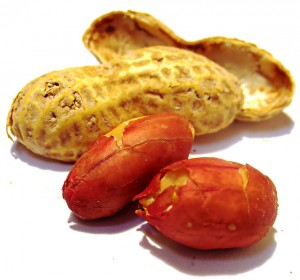 Peanuts are a particularly bad type of legume, and are something that pretty much everyone should avoid.
Peanuts are a particularly bad type of legume, and are something that pretty much everyone should avoid.
There are 2 particular reasons for this:
1. Peanuts contain Peanut Agglutinin, which is one of the most problematic lectins. It’s not adequately broken down by heat, so it causes all of the digestive, inflammatory, and immune problems discussed above.
2. Secondly, peanuts (unless, perhaps you’re eating them within 10 minutes of picking them from the farm) usually contain Aflatoxins, which have been definitively linked to increased risks of cancer.
Soy is the Worst Kind of Legume
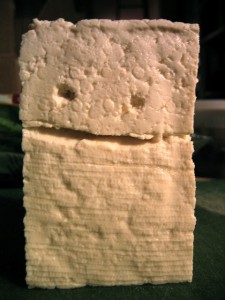 If there is any legume I’d avoid above all others, it would probably be soy (with peanuts being a close 2nd). There are a variety of reasons for this:
If there is any legume I’d avoid above all others, it would probably be soy (with peanuts being a close 2nd). There are a variety of reasons for this:
First, when you eat soy, you typically aren’t just eating the bean itself. Most of the time, you’re eating a processed form such as tofu or soy milk, where the toxins have been concentrated and amplified.
Because of this, soy products are a huge source of lectins, phytates, and particularly phtyoestrogens, which cause all sorts of hormonal problems.
For men, this can often lead to “man-boobs” and infertility, and for women, it can also mean infertility as well as menstrual problems, as well as a host of other problems, such as bladder cancer, asthma, and increased incidence of Alzheimers. (See this article for more studies and side effects.)
The impact on infants who are fed soy formulas can be even worse and more devastating.
Moreover, soy can also lead to faster brain deterioration. It’s unclear whether this effect is caused primarily by the phytoestrogens in soy or the fact that many people who eat a lot of soy don’t eat enough good sources of B-12, such as meat.
In addition to everything else, almost all of the soy in the US is GMO.
So Should You Eat Legumes??
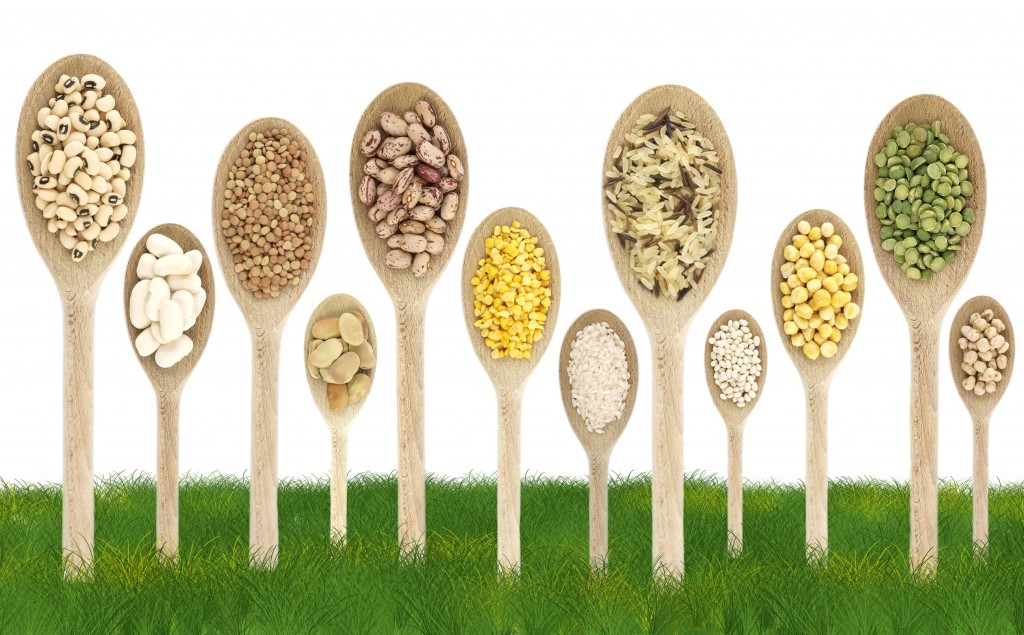
Despite all of the possible negative effects that I’ve pointed out, I can’t really say that you should definitively avoid legumes. Aside from peanuts and soy, they’re typically better than grains, and if I were vegetarian, I’d almost certainly eat legumes in order to get more protein.
And yet, I can’t ever imagine recommending legumes as a nutritious part of a healthy diet. There is far too little to gain from eating beans versus the potential for digestive and hormonal side effects.
However, if you are going to eat legumes, then it makes sense to eat them the same way that humans have for about 10,000 years (by soaking and sprouting them). (Editorial note: I want to clarify that peas and green beans are Paleo even though they are legumes. This article explains why this is so.)
The process of soaking, sprouting, and/or fermenting can break down many of the lectins and phytates, and if you’re fermenting, you’ll also get some bacteria in there that is very good for your gut.
Personally, I tend to follow the lead of Jack’s mom and toss my beans out the window, hoping that something more magical will come of it. (Cheeky. But true.)
Images: Copyright (c) 123RF Stock Photos and Fotolia.com (c) luigi giordano, aakriti, Marek.

